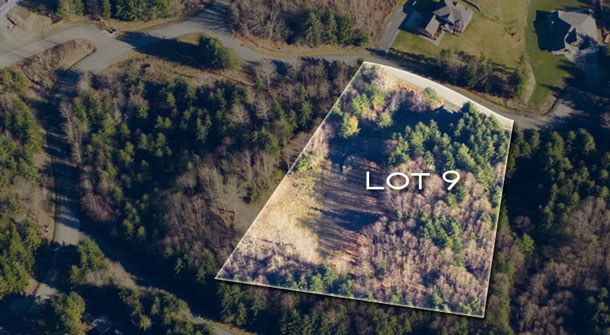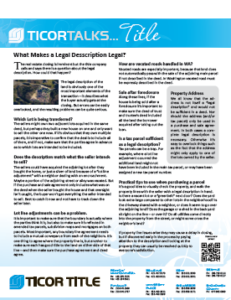The real estate closing is imminent but the title company calls and says there is a question about the legal description. How could that happen?
The legal description of the land is obviously one of the most important elements of the transaction – it describes what the buyer actually gets at the closing. But errors can be easily overlooked, and the resulting problems can be quite serious.
Legal description details to watch for:
Which Lot is being transferred?
The sellers might own two adjacent lots acquired in the same deed, but perhaps they built a new house on one and only want to sell the other one now. If it’s obvious that they own multiple parcels, it is imperative to confirm that the deal is to include all of them, and if not, make sure that the parties agree in advance as to which lots are intended to be included.
Does the description match what the seller intends to sell?
The sellers could have acquired the adjoining lot after they bought the home, or just a sliver of land because of a “lot line adjustment” with a neighbor dealing with an encroachment. Maybe a portion of the adjoining street or alley was vacated. But if the purchase and sale agreement only includes what was on the deed when the seller bought the house and that oversight isn’t caught, the buyer won’t get everything the seller intended to sell. Best to catch it now and not have to track down the seller later.
Lot line adjustments can be a problem.
It is important to make sure that the boundary is actually where the parties think it is, but also to make sure it’s reflected in amended tax parcels, subdivision maps and mortgages on both parcels. Most important, any boundary line agreement needs to include a mutual conveyance from each of the neighbors. It’s one thing to agree where the property line is, but another to make sure each has good title to the land on either side of that line – and then make sure the purchase agreement and deed agree.
Vacated Roads
Road vacation is the legal process of undoing a road creation. The vacated road ceases to be a
public road where the public has the right to travel. The vacated property usually reverts to the abutting owners up to the center of the road.
How are vacated roads handled in WA?
Vacated roads are especially important, because that land does not automatically pass with the sale of the adjoining main parcel if not described in the deed. In Washington vacated road must be expressly described in the deed.
Sale after foreclosure
Along these lines, if the house is being sold after a foreclosure it’s important to make sure the deed of trust and trustee’s deed included all the land the borrower acquired after taking out the loan.
We all know that the address is not itself a “legal description” and would not be sufficient in a deed. Nor should the address (and/or tax parcel) only be used in a purchase and sale agreement. In both cases a complete legal description is necessary. Otherwise it’s easy to overlook things such as the fact that the address might only apply to one of the lots owned by the seller.
Is a tax parcel sufficient as a legal description?
Tax parcels can be a trap. For example, where a lot line adjustment occurred the additional land might not have been included in the main tax parcel, or may have been assigned a new tax parcel number.
“It’s a good idea to visually check the property, and walk the property lines with the seller with a legal description in hand.”
Practical tips to use when purchasing a parcel
It’s a good idea to visually check the property, and walk the property lines with the seller with a legal description in hand. Is there a vacant lot or a “greenbelt” next door? Does the yard look extra-large compared to other lots in the neighborhood? Is the driveway shared with a neighbor, or does it seem to go over the adjoining land? Does the garage or a shed in the back yard sit right on the line – or over it? Do all utilities come directly into the property from the street, or might some cross the neighbor’s land?
If property line issues arise they may cause a delay in closing, but if discovered early in the process by paying attention to the description and looking at the property they can usually be resolved quickly to everyone’s satisfaction.
For information on the types of legal descriptions, click the link below:
Real estate legal descriptions in WA


 Calculate rates for your GFE instantly! Try out the free title and escrow rate calculator today!
Calculate rates for your GFE instantly! Try out the free title and escrow rate calculator today! 





 Tip: Click the keyword links in this post to view the definition of the keyword (i.e. click on:
Tip: Click the keyword links in this post to view the definition of the keyword (i.e. click on: 
